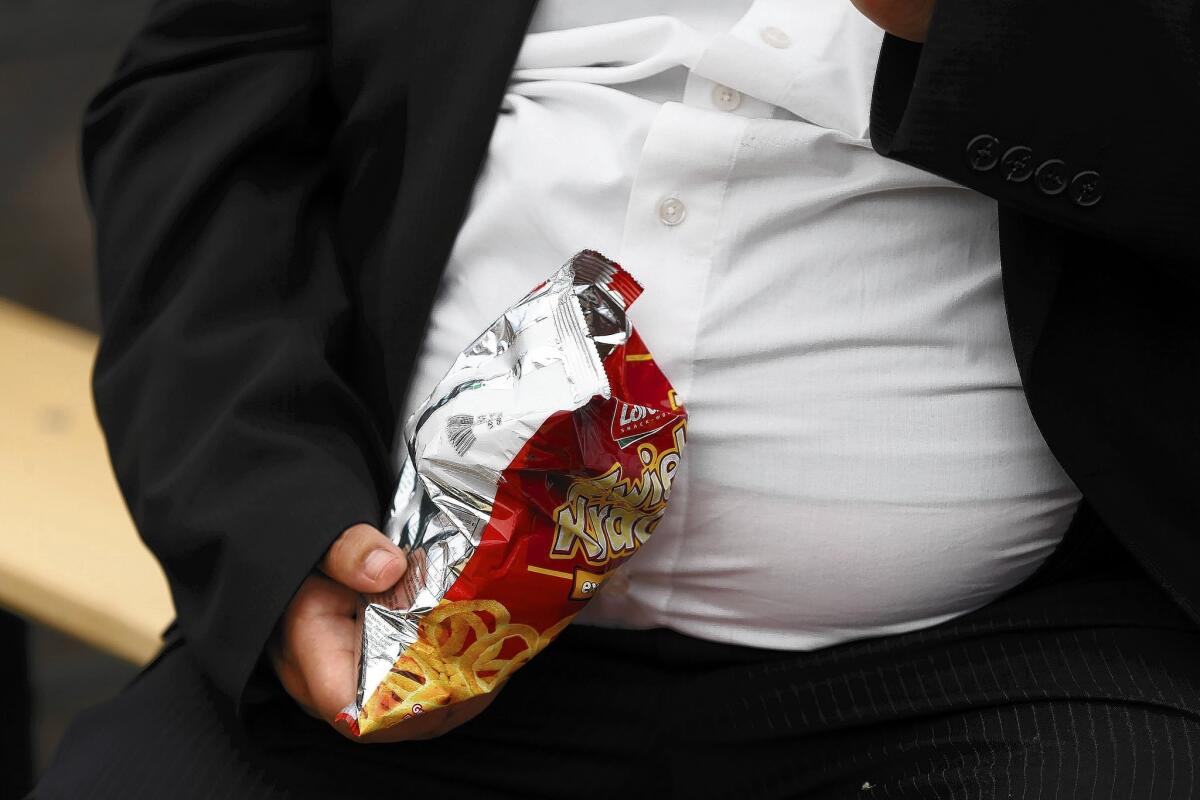Unraveling any weight-gain links to stress, cortisol

Hereâs some not especially breaking news: Lots of Americans are over-stressed, and lots of those very same Americans also are overweight. Surely, it would appear, stress must be one of the most fattening things outside of a KFC Double Down sandwich.
Over the years, the weight-loss industry has tried to cash in on the connection between stress and weight with a variety of miracle slimming pills. The website for the supplement CortiSlim puts the pitch simply: âIf youâre under stress, if you want to trim your waistline, you should try CortiSlim now.â The site explains that the hormone cortisol is one of the key players in turning stress into extra pounds.
CortiSlim no longer claims to actually block cortisol â a lawsuit from the Federal Trade Commission put an end to that â but the message is still clear: Control your cortisol, control your weight. Simple as that, except itâs not even remotely that simple, says Susan Fried, professor of medicine at Boston University School of Medicine and director of the Boston Nutrition and Obesity Research Center. Stress really can be fattening, she says, but it will likely take more than a pill to break the chain between a bad day at work and a big number on the scale.
Thereâs a grain of truth to the claim that cortisol by itself can cause weight gain, Fried says. She notes that people with Cushingâs syndrome, a disease that causes an overproduction of cortisol, carry large amounts of visceral fat, the deep-seated type that raises the risk of heart disease and diabetes. Also, she says, visceral fat tends to pile up in people with demanding, high-pressure jobs and ânasty bosses.â
Still, fully connecting the dots between cortisol and weight gain is no easy task. âI could name 20 different steps in the pathway,â Fried says. âItâs a very complicated story.â Among other things, she says, cortisol can turn on genes that promote the buildup of visceral fat. And in some people, cortisol seems to encourage overeating by blunting the effects of leptin, a hormone that controls appetite.
It would be a huge stretch to say that stress has much to do with our expanding waistlines, says Dr. Jonathan Purnell, professor of endocrinology and cardiology at Oregon Health and Science University School of Medicine in Portland. âThe obesity epidemic is a new thing, and itâs not because weâre stressed,â he says. âCan you tell me that weâre that much more stressed now than in the pioneer days?â
Purnell says some people seem to be more sensitive to cortisol than others. And when it comes to weight gain, he believes sensitivity matters more than stress. In other words: If youâre especially sensitive to cortisol, you could gain extra visceral fat even if you spend your days in a beachside hammock instead of a cubicle.
Contrary to many claims over the years, it doesnât seem possible that any pill could speed weight loss by blocking cortisol, Purnell says. Cortisol has a lot of useful functions in the body, he says, and the body would go into âcrisis modeâ if levels ever dropped low enough to cause weight loss.
Cortisol aside, thereâs no doubt that managing stress can be a crucial step toward healthy, long-lasting weight loss, says Sofia Rydin-Gray, a psychologist at the Duke Diet and Fitness Center in Durham, N.C.
According to Rydin-Gray, some people actually lose appetite when theyâre stressed out, âbut those arenât the sort of people who come to our center.â Instead, most of her clients have a long history of turning to comfort food â hamburgers, cakes, huge plates of pasta alfredo, heavy on the cream â during stressful times. She says stress can also disrupt sleep, making a person too tired to exercise the next day, a prime scenario for putting on unwanted pounds.
Rydin-Gray tries to help people break the cycle of stress and weight by being more mindful about their eating. She says dieters should slow down to think about the food thatâs entering their mouths, not the fleeting sense of security or comfort that comes with it.
Beyond the dinner table, she teaches clients to use relaxation techniques such as meditation and guided imagery. One of the most important stress-busters is something that overweight people already know about. âExercise helps a lot with stress,â Rydin-Gray says.






